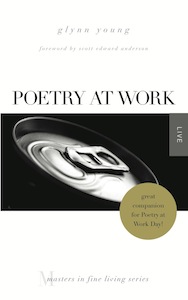The workplace, like the rest of the world we live in, is a mixture of the good and bad, of nobility of purpose and unbridled ambition, of supportive encouragement and backstabbing politics. Someone once told me that if you get more than two people in a room, you have the ingredients for conflict, politics, and factions. Working in high-pressure workplaces only intensifies this tendency for conflict (additionally fueled by intra-office email).
To make sense of this, and sometimes to seek a resolution, I write poems. From what I hear from friends and colleagues, this could become an entire genre of poetry—the poetry of workplace conflict.
I don’t write nasty little darts aimed at superiors, subordinates, or colleagues. Save that for Twitter or Facebook. (I once watched two colleagues battle it out with each other on their Facebook pages, and I finally intervened when it showed no signs of stopping.)
Instead, I try to think through what might be at the heart of the matter, reflect on it, and then begin to understand it by writing a poem or series of poems.
I’ve done this when (1) someone was unjustifiably laid off; (2) the workplace became overwhelming; (3) a conflict (not necessarily involving me) broke into the open or, even worse, stayed disruptively hidden; (4) dealing with a career disappointment; (5) dealing with a career success, which can be even more of a problem than a disappointment; (6) people use their titles or positions to force their desired path or outcome; (7) meetings go on behind closed doors that result in bad decisions; and (8) resources were over-allocated to one area while another area starved.
These are just a few of the situations. Poetry can be useful, sometimes helpful, in just about any kind of challenge or problem in the workplace.
This poetic exercise has taught me two things.
First, I’m surprised at how much workplace conflict is driven by fear. Fear of someone seeming smarter or more capable. Fear of embarrassment. Fear of what may happen if we accept responsibility. Fear of making a mistake. Fear of failure. Fear of loss or respect or position. Fear of doing something new or different.
All of us experience these very human fears. All of us have been affected, sometimes overwhelmed, by these fears. Poetry—writing a poem—can often help identify these fears and how they motivate ourselves and others.
Second, I’ve found that writing poetry to address these workplace situations has a calming effect. Allowing our thoughts and fears to flow into our pens and keyboards (I prefer a pen for a first draft) helps diminish anxiety and angst. I can often look at very tense and intense situations more calmly and with a better perspective (not always, mind you, but often).
Try it. Try using poetry to explain and understand a problem or challenge (or crisis or disaster) in your workplace. See what happens. Problems may not be immediately resolved, but understanding will increase.
Photograph by Alice Popkorn, Creative Commons license via Flickr. Poetry at Work™ post by Glynn Young, author of the novels Dancing Priest and the recently published A Light Shining.
_____________________
“This book is elemental.”
—Dave Malone, poet and professor
- Poets and Poems: Sandra Marchetti and “Diorama” - April 24, 2025
- Poets and Poems: Christina Cook and “Roaming the Labyrinth” - April 22, 2025
- Longfellow’s “Paul Revere’s Ride”: Creating a National Legend - April 17, 2025


Claire says
I wrote a poem today. What you write is true.
L. L. Barkat says
Claire, that is a totally, totally amazing photo, btw 🙂 You find the best stuff.
Maureen Doallas says
Wouldn’t it be great if everyone could take a timeout with words?
If we ever get back to the days when companies offered employees perks, I’d recommend offering a room where employees distressed or experiencing stress could go to open a notebook – or, on a computer, a Word doc – and just write till the emotion passes or another way arises to think about the problem.
L.L. Barkat says
A timeout with words. I love that, Maureen! 🙂
And the idea of a writing perk just makes me smile.
Glynn, this is such a clear-eyed, compassionate post. And it feels like it could be very freeing for people. I hope it goes far and wide.
Megan Willome says
Believe it or not, work is my most conflict-free zone. But I do exactly what you describe in other areas and situations in my life.